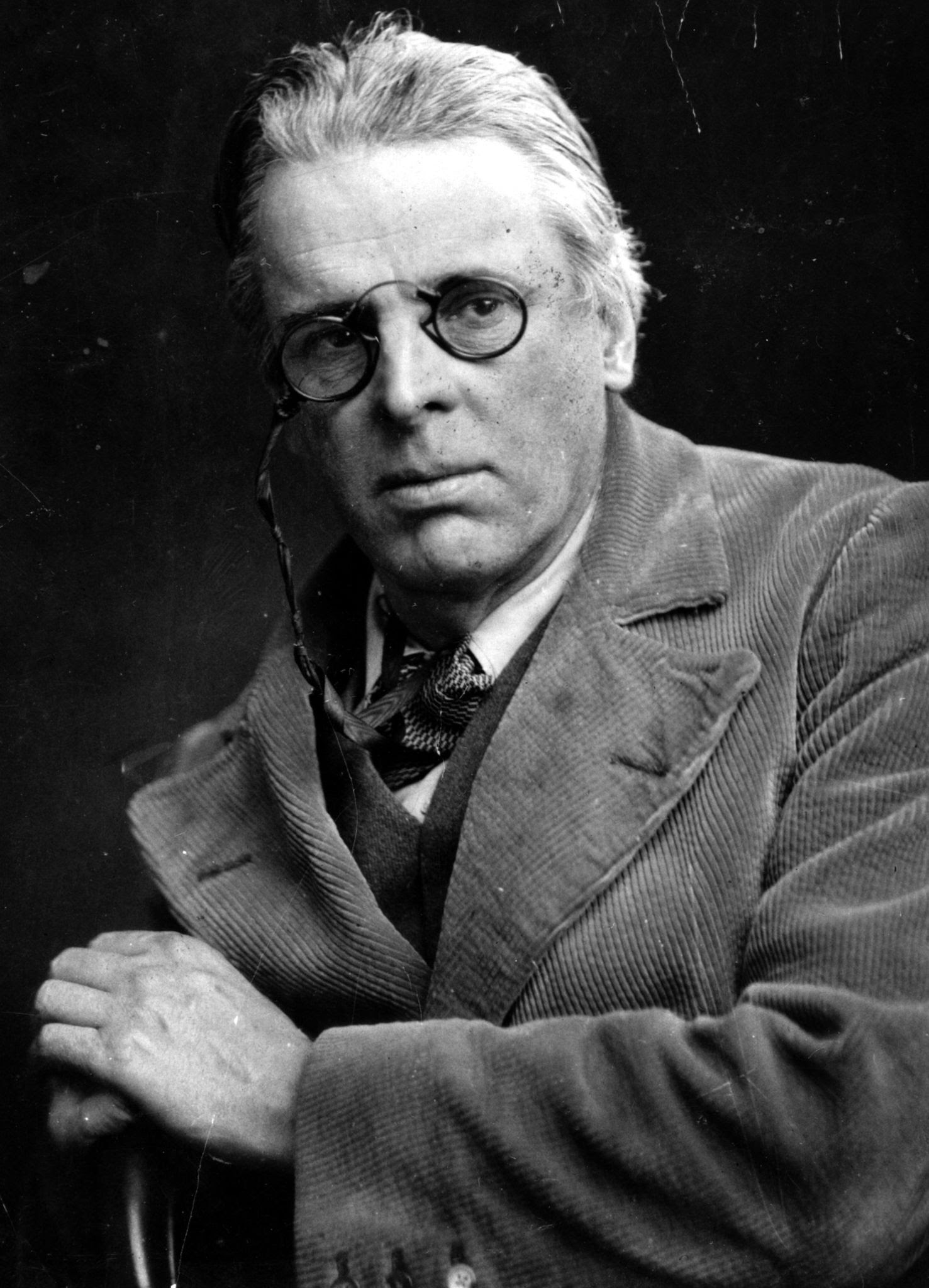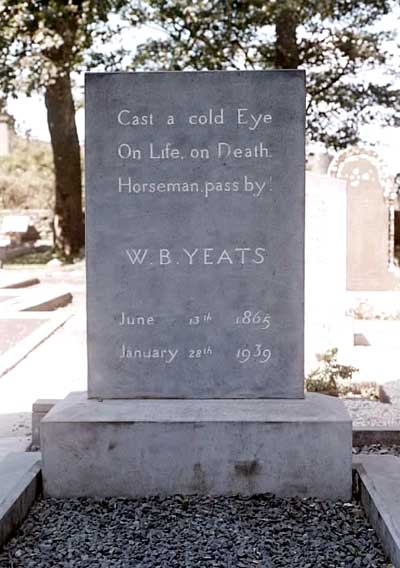Difference between revisions of "W.B. Yeats"
Occultwiki (talk | contribs) |
Occultwiki (talk | contribs) |
||
| Line 42: | Line 42: | ||
During 1885, Yeats was involved in the formation of the Dublin Hermetic Order. That year the Dublin Theosophical lodge was opened in conjunction with Brahmin Mohini Chatterjee, who travelled from the Theosophical Society in London to lecture. Yeats attended his first séance the following year. He later became heavily involved with the Theosophy and with hermeticism, particularly with the eclectic [[Rosicrucian|Rosicrucianism]] of the [[Hermetic Order of the Golden Dawn]]. | During 1885, Yeats was involved in the formation of the Dublin Hermetic Order. That year the Dublin Theosophical lodge was opened in conjunction with Brahmin Mohini Chatterjee, who travelled from the Theosophical Society in London to lecture. Yeats attended his first séance the following year. He later became heavily involved with the Theosophy and with hermeticism, particularly with the eclectic [[Rosicrucian|Rosicrucianism]] of the [[Hermetic Order of the Golden Dawn]]. | ||
He was admitted into the Golden Dawn in March 1890 and took the magical motto ''Daemon est Deus inversus''—translated as "Devil is God inverted." He was an active recruiter for the sect's Isis-Urania Temple, and brought in his uncle George Pollexfen, Maud Gonne, and Florence Farr. Although he reserved a distaste for abstract and dogmatic religions founded around personality cults, he was attracted to the type of people he met at the Golden Dawn. He | He was admitted into the Golden Dawn in March 1890 and took the magical motto ''Daemon est Deus inversus''—translated as "Devil is God inverted." He was an active recruiter for the sect's Isis-Urania Temple, and brought in his uncle George Pollexfen, Maud Gonne, and Florence Farr. Although he reserved a distaste for abstract and dogmatic religions founded around personality cults, he was attracted to the type of people he met at the Golden Dawn. | ||
In 1901, with the dissensions in the Golden Dawn, Yeats questioned the validity of the mysterious [[Cipher Manuscripts]] in a privately published a pamphlet titled ''Is the Order of R.R. et A. C. to Remain a Magical Order?''. He became involved in the Order's power struggles, both with Farr and [[Samuel L. MacGregor Mathers]], and was present when Mathers sent [[Aleister Crowley]] to repossess Golden Dawn paraphernalia during the "Battle of Blythe Road." After the Golden Dawn ceased and splintered into various offshoots, Yeats remained with the Stella Matutina until 1921. | |||
Yeats was an early influence on child prodigy [[Frederick Santee]], having met him while Santee was pursuing his graduate degree at Oxford. | Yeats was an early influence on child prodigy [[Frederick Santee]], having met him while Santee was pursuing his graduate degree at Oxford. | ||
Revision as of 17:58, 19 September 2024
William Butler Yeats (13 June 1865 – 28 January 1939) was an Irish poet, dramatist, writer, and politician. One of the foremost figures of 20th-century literature in the English-speaking canon, he was a driving force behind the Irish Literary Revival and became a pillar of the Irish literary establishment who helped to found the Abbey Theatre. In his later years, he served two terms as a Senator of the Irish Free State.
Biography
William Butler Yeats was born in Sandymount in County Dublin, Ireland. He began writing his first works when he was seventeen; these included a poem—heavily influenced by Percy Bysshe Shelley—that describes a magician who set up a throne in central Asia.
His first significant poem was "The Island of Statues," a fantasy work that took Edmund Spenser and Shelley for its poetic models. The piece was serialized in the Dublin University Review. Yeats wished to include it in his first collection, but it was deemed too long, and in fact, was never republished in his lifetime.
In 1889, Yeats met Maud Gonne, a 23-year-old English heiress and ardent Irish nationalist. She was eighteen months younger than Yeats and later claimed she met the poet as a "paint-stained art student." Gonne admired "The Island of Statues" and sought out his acquaintance. Yeats began an obsessive infatuation, and she had a significant and lasting effect on his poetry and his life thereafter. In 1891 he visited Gonne in Ireland and proposed marriage, but was rejected. He later admitted that from that point "the troubling of my life began."
In 1899, Yeats, Lady Gregory, Edward Martyn and George Moore founded the Irish Literary Theatre to promote Irish plays. The ideals of the Abbey were derived from the avant-garde French theatre. Yeats was close to Lady Gregory and her home place of Coole Park, County Galway. He would often visit and stay there as it was a central meeting place for people who supported the resurgence of Irish literature and cultural traditions.
In 1917, Yeats proposed to 25-year-old Georgie Hyde-Lees (1892–1968), known as George. Their marriage was a success, in spite of the age difference, and in spite of Yeats's feelings of remorse and regret during their honeymoon. The couple went on to have two children, Anne and Michael. Although in later years he had romantic relationships with other women, Georgie herself wrote to her husband: "When you are dead, people will talk about your love affairs, but I shall say nothing, for I will remember how proud you were."
Irish Free State Senator
In 1922, he was appointed Senator for the Irish Free State. He was a fierce opponent of individualism and political liberalism and saw the fascist movements as a triumph of public order and the needs of the national collective over petty individualism. He was re-appointed for a second term in 1925. Early in his tenure, a debate on divorce arose, and Yeats viewed the issue as primarily a confrontation between the emerging Roman Catholic ethos and the Protestant minority.
When the Roman Catholic Church weighed in with a blanket refusal to consider their anti position, The Irish Times countered that a measure to outlaw divorce would alienate Protestants and "crystallise" the partition of Ireland. In response, Yeats delivered a series of speeches that attacked the "quixotically impressive" ambitions of the government and clergy, likening their campaign tactics to those of "medieval Spain."
In 1924, he chaired a coinage committee charged with selecting a set of designs for the first currency of the Irish Free State. Aware of the symbolic power latent in the imagery of a young state's currency, he sought a form that was "elegant, racy of the soil, and utterly unpolitical."
Nobel Prize
In December 1923, Yeats was awarded the Nobel Prize in Literature "for his always inspired poetry, which in a highly artistic form gives expression to the spirit of a whole nation." Politically aware, he knew the symbolic value of an Irish winner so soon after Ireland had gained independence, and highlighted the fact at each available opportunity.
The prize led to a significant increase in the sales of his books, as his publishers Macmillan sought to capitalise on the publicity. For the first time he had money, and he was able to repay not only his own debts but those of his father.
Later life
At the age of 69 he was 'rejuvenated' by the Steinach operation which was performed on 6 April 1934 by Norman Haire. For the last five years of his life Yeats found a new vigour evident from both his poetry and his intimate relations with younger women. During this time, Yeats was involved in a number of romantic affairs with, among others, the poet and actress Margot Ruddock, and the novelist, journalist and sexual radical Ethel Mannin. As in his earlier life, Yeats found erotic adventure conducive to his creative energy, and, despite age and ill-health, he remained a prolific writer.
From 1935 to 1936 he travelled to the Western Mediterranean island of Majorca with Indian-born Shri Purohit Swami and from there the two of them performed the majority of the work in translating the principal Upanishads from Sanskrit into common English.
Death
He died at the Hôtel Idéal Séjour, in Menton, France, on 28 January 1939, aged 73. He was buried after a discreet and private funeral at Roquebrune-Cap-Martin. Attempts had been made at Roquebrune to dissuade the family from proceeding with the removal of the remains to Ireland due to the uncertainty of their identity. His body had earlier been exhumed and transferred to the ossuary.
Yeats and George had often discussed his death, and his express wish was that he be buried quickly in France with a minimum of fuss. According to George, "His actual words were 'If I die, bury me up there [at Roquebrune] and then in a year's time when the newspapers have forgotten me, dig me up and plant me in Sligo'." In September 1948, Yeats's body was moved to the churchyard of St Columba's Church, Drumcliff, County Sligo.
Involvement with the occult
Yeats had a lifelong interest in mysticism, spiritualism, occultism and astrology. He read extensively on the subjects throughout his life, became a member of the paranormal research organisation "The Ghost Club" in 1911. His mystical interests, inspired by a study of Hinduism, formed much of the basis of his late poetry. During séances held from 1912, a spirit calling itself "Leo Africanus" apparently claimed it was Yeats's Daemon or anti-self.
Golden Dawn
During 1885, Yeats was involved in the formation of the Dublin Hermetic Order. That year the Dublin Theosophical lodge was opened in conjunction with Brahmin Mohini Chatterjee, who travelled from the Theosophical Society in London to lecture. Yeats attended his first séance the following year. He later became heavily involved with the Theosophy and with hermeticism, particularly with the eclectic Rosicrucianism of the Hermetic Order of the Golden Dawn.
He was admitted into the Golden Dawn in March 1890 and took the magical motto Daemon est Deus inversus—translated as "Devil is God inverted." He was an active recruiter for the sect's Isis-Urania Temple, and brought in his uncle George Pollexfen, Maud Gonne, and Florence Farr. Although he reserved a distaste for abstract and dogmatic religions founded around personality cults, he was attracted to the type of people he met at the Golden Dawn.
In 1901, with the dissensions in the Golden Dawn, Yeats questioned the validity of the mysterious Cipher Manuscripts in a privately published a pamphlet titled Is the Order of R.R. et A. C. to Remain a Magical Order?. He became involved in the Order's power struggles, both with Farr and Samuel L. MacGregor Mathers, and was present when Mathers sent Aleister Crowley to repossess Golden Dawn paraphernalia during the "Battle of Blythe Road." After the Golden Dawn ceased and splintered into various offshoots, Yeats remained with the Stella Matutina until 1921.
Yeats was an early influence on child prodigy Frederick Santee, having met him while Santee was pursuing his graduate degree at Oxford.
Automatic writing
During the first years of marriage to Georgie Hyde-Lees, she and Yeats experimented with automatic writing; she contacted a variety of spirits and guides they called "Instructors" while in a trance. The spirits communicated a complex and esoteric system of philosophy and history, which the couple developed into an exposition using geometrical shapes: phases, cones, and gyres.
Yeats devoted much time to preparing this material for publication as A Vision (1925). In 1924, he wrote to his publisher T. Werner Laurie, admitting: "I dare say I delude myself in thinking this book my book of books."

